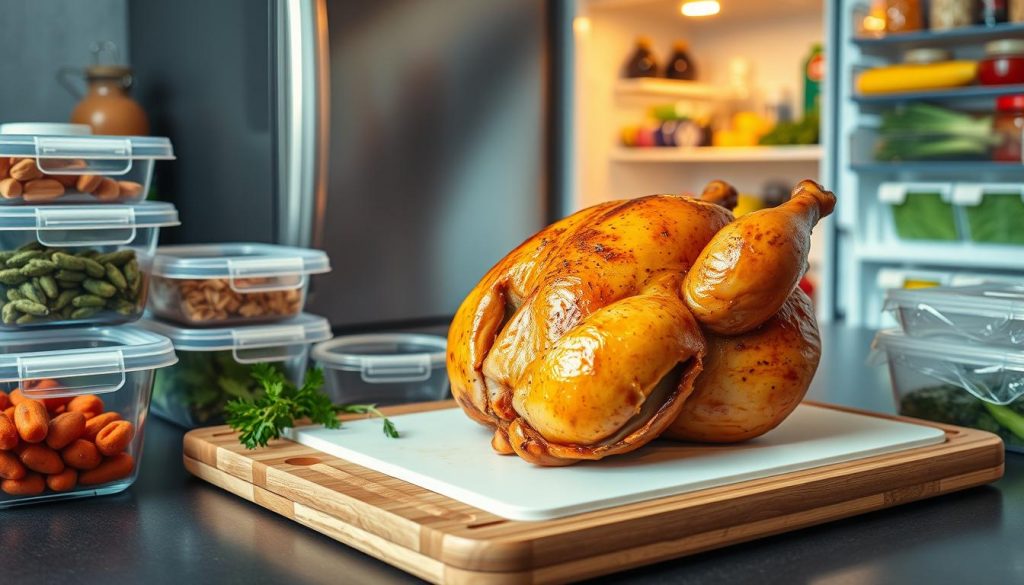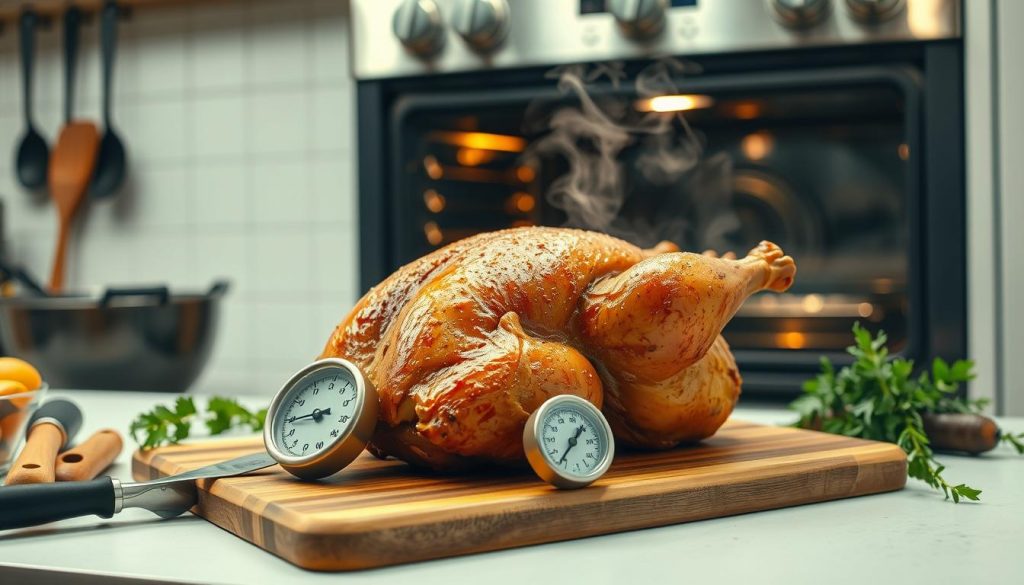Rotisserie chicken is a favorite for many. It’s tasty, easy to use, and fits many meals. But, how long can we keep it safe in the fridge? Let’s look into how to store rotisserie chicken safely and keep it tasty.
For cooked chicken, timing is everything. Storing it right can make a big difference. We’ll cover how to keep your rotisserie chicken fresh and safe to eat, even after it’s home.
Key Takeaways
- Proper rotisserie chicken storage is crucial for food safety
- Refrigerated cooked chicken has a limited shelf life
- Temperature control is essential for maintaining freshness
- Correct packaging helps extend the chicken’s lifespan
- Knowing signs of spoilage is important for safe consumption
Understanding Rotisserie Chicken Storage Basics
Storing rotisserie chicken right is key to keeping it safe and tasty. We’ll look at the main things to do to keep your chicken fresh and yummy.
The Importance of Proper Storage Temperature
Keeping your rotisserie chicken at the right temperature is very important. The fridge should be at 40°F (4°C) or colder. This cold keeps bacteria from growing too fast, making your chicken safe to eat for a longer time.
Safe Handling After Purchase
It’s very important to follow food safety rules when you get your rotisserie chicken. Put it in the fridge within two hours, or one hour if it’s really hot outside. Always use clean tools and surfaces to avoid spreading germs.
Optimal Storage Containers
Choosing the right containers is crucial for keeping your chicken fresh. Containers that seal well stop moisture loss and keep smells out. Glass or BPA-free plastic containers with tight lids are great for storing chicken.
| Storage Method | Pros | Cons |
|---|---|---|
| Airtight containers | Prevents moisture loss, blocks odors | Requires additional storage space |
| Plastic wrap | Space-efficient, readily available | Less effective at sealing out air |
| Aluminum foil | Molds to chicken shape | Can tear easily, not reusable |
By sticking to these storage tips, your rotisserie chicken will stay fresh and safe to eat for a long time.
How Long Does a Rotisserie Chicken Last in the Fridge
The shelf life of cooked chicken is very important for food safety. Rotisserie chicken needs the right storage to last longer. Let’s explore how long you can keep this tasty meal before it goes bad.
A rotisserie chicken can stay in the fridge for 3 to 4 days if stored right. This matches the safe time for most cooked chicken. To keep it fresh, refrigerate your chicken within two hours of buying or cooking.
“Cooked chicken, including rotisserie chicken, should be consumed within 3 to 4 days when refrigerated at 40°F (4°C) or below.”
Here’s a quick guide on cooked chicken’s shelf life based on storage:
| Storage Method | Shelf Life |
|---|---|
| Refrigerator (40°F or below) | 3-4 days |
| Freezer (0°F or below) | 4-6 months |
| Room Temperature | 2 hours |
These times are just guidelines. Always check for spoilage before eating refrigerated chicken, no matter the storage time. Proper storage helps us enjoy rotisserie chicken safely and cuts down on waste.
Signs of Spoilage in Stored Rotisserie Chicken
It’s important to know how to spot spoiled chicken. We’ll show you how to check for spoilage. This helps keep your food fresh and safe.
Visual Indicators of Spoiled Chicken
Here are the visual signs to look for:
- Discoloration: Gray, green, or moldy patches
- Slimy texture: A glossy, sticky surface
- Visible mold: Fuzzy growths in any color
Smell and Texture Changes
Your nose is great for spotting spoiled food. Fresh chicken smells mild. A sour or rotten smell means it’s bad.
The chicken should feel firm. If it’s slimy, it’s not safe to eat.
When to Discard Stored Chicken
Use your senses to decide if chicken is good. If you see any bad signs, throw it away:
- Off-putting odor
- Changed color or texture
- Passed the 3-4 day storage limit
Storing chicken right and eating it on time is key. It keeps your food fresh and safe.
Best Practices for Storing Rotisserie Chicken
Learning how to store rotisserie chicken is crucial. It keeps your meal fresh and tasty. We’ve got top tips to help you.

Cool your chicken fast. Cut it into smaller pieces and put it in the fridge within two hours. This quick cooling stops bacteria from growing.
Use shallow, airtight containers for storing. They keep moisture in and odors out. If you don’t have containers, wrap the chicken in foil or plastic wrap.
- Store chicken in the coldest part of your fridge, typically the back
- Keep it away from raw meats to avoid cross-contamination
- Label containers with the date of purchase for easy tracking
Follow these tips to keep your rotisserie chicken fresh for up to four days. For longer, freeze parts for up to four months.
“Proper storage is the secret to enjoying your rotisserie chicken for days after purchase.”
When reheating, make sure it reaches 165°F (74°C). This kills bacteria. These storage methods help your chicken last longer and cut down on waste.
Maximizing Freshness Through Proper Packaging
Proper packaging is key to keeping your rotisserie chicken fresh and safe to eat. Let’s explore the best food storage containers and chicken preservation methods to extend the life of your delicious meal.
Recommended Storage Containers
Glass or plastic containers with tight-fitting lids are ideal for storing rotisserie chicken. These containers prevent air from entering and keep moisture locked in. We prefer glass containers as they don’t absorb odors and are easy to clean.
Wrapping Techniques for Longer Shelf Life
Before placing your chicken in a container, wrap it tightly in aluminum foil or plastic wrap. This extra layer of protection helps maintain moisture and prevents the chicken from drying out. For best results, remove the chicken from the bones and wrap individual portions.
Air-Tight Storage Solutions
Airtight packaging is crucial for preserving your rotisserie chicken. Vacuum-sealed bags are an excellent option, as they remove all air and create a perfect seal. If you don’t have a vacuum sealer, press out as much air as possible from zip-top bags before sealing.
- Use containers with locking lids for an extra tight seal
- Invest in silicone food storage bags for a reusable, airtight option
- Consider using beeswax wraps as an eco-friendly alternative to plastic
By following these packaging tips, you’ll keep your rotisserie chicken fresh and tasty for longer. Remember, proper storage is essential for food safety and quality.
Reheating Stored Rotisserie Chicken Safely

Reheating cooked chicken safely is very important. We must make sure it reaches the right temperature to kill bacteria. Let’s look at some safe and tasty ways to warm up your stored chicken.
The oven is a good choice to keep the chicken juicy. Heat your oven to 350°F. Put the chicken in a dish and cover it with foil. Heat for 25 minutes or until it’s 165°F inside. This way to reheat rotisserie chicken keeps it moist and flavorful.
The microwave is quick for reheating. Put chicken on a microwave-safe plate and cover with a damp paper towel. Heat in 30-second bursts until it’s warm. Always check the temperature with a food thermometer to make sure it’s safe.
Here’s a quick guide for reheating:
| Method | Time | Temperature |
|---|---|---|
| Oven | 25-30 minutes | 350°F |
| Microwave | 2-3 minutes | High |
| Stovetop | 5-7 minutes | Medium heat |
After reheating, you can get creative with your chicken. Shred it for tacos, add it to soup, or stir-fry it. There are many ways to use leftover chicken, making it a great ingredient for quick meals.
Tips for Extending Rotisserie Chicken Shelf Life
We all love the ease of rotisserie chicken. But, making it last longer can be tough. Let’s look at some ways to keep your chicken fresh for days.
Temperature Management Tips
It’s important to keep your chicken at the right temperature. Make sure your fridge is between 35°F and 40°F. Use a thermometer to check it often.
Put the chicken in the coldest part of your fridge. This is usually the back of the bottom shelf.
Portioning Before Storage
Divide your rotisserie chicken into smaller parts before storing. This helps it cool faster and reheat easier. Use airtight containers or zip-top bags for each portion.
Label them with the date so you can keep track.
Cross-Contamination Prevention
Stop bacteria spread with smart fridge organization. Store chicken on the bottom shelf to avoid drips on other foods. Use a plate or tray under the container for extra safety.
Keep raw meats separate from cooked foods.
- Wash hands before and after handling chicken
- Use separate cutting boards for raw and cooked meats
- Clean all surfaces that come in contact with the chicken
By following these tips, you’ll keep your rotisserie chicken fresh and safe. Remember, proper storage is key to enjoying your chicken for days!
Common Storage Mistakes to Avoid
We often make food storage errors without realizing it. When it comes to rotisserie chicken, these mistakes can lead to spoilage or foodborne illness. One common chicken preservation pitfall is leaving the chicken at room temperature for too long. Always refrigerate your rotisserie chicken within two hours of purchase or cooking.
Another frequent refrigeration mistake is storing the chicken in its original container. These containers aren’t airtight, which can dry out the chicken and allow bacteria to grow. Instead, transfer the chicken to an airtight container or wrap it tightly in aluminum foil or plastic wrap.
Placing hot chicken directly in the fridge is another error to avoid. This can raise the internal temperature of your refrigerator, putting other foods at risk. Let the chicken cool for about 30 minutes before refrigerating. By avoiding these common storage mistakes, we can keep our rotisserie chicken safe and tasty for longer.




